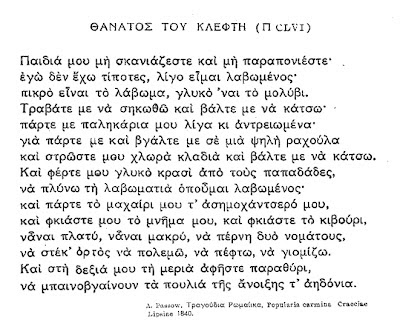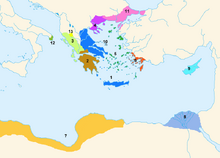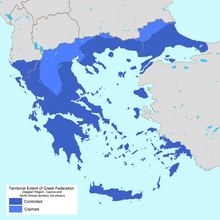Ετικέτες
- -Παράδοση (140)
- Αμερική-Η.Π.Α (148)
- Αμερική-Η.Π.Α. (2675)
- Ανταρκτική (7)
- Άρης (15)
- Ασία-Μ.Ανατολή (2763)
- Αστρονομία- Επιστήμη (895)
- Αυστραλία (82)
- Αφρικη (307)
- Αφρική (199)
- Αφροδίτη (3)
- Διεθνή (6429)
- Εναλλακτική Ιστορία (274)
- Εξ. Πολιτική (Αρχές) (152)
- Επιστήμη-Διάστημα (170)
- Εσωτερική πολιτική (3342)
- Ευρώπη (7882)
- Ζητήματα Ελληνισμού (12750)
- Ζητήματα Στρατηγικής (3077)
- Ζητήματα Στρατηγικής Μονάδες (2)
- Ζητήματα Στρατηφικής (365)
- Ζωικό Βασίλειο (102)
- Θρησκευτικά Ζητημάτα (1706)
- Ιατρικά (384)
- Ιστορία-Μέθοδολογία (278)
- Ιστορικά (9668)
- Κοινωνία (3026)
- Κουρδικό (301)
- Κρόνος (1)
- Κύπρος (743)
- Μαγειρική (123)
- Μεθοδολογία (33)
- Μονάδες (3570)
- Οικονομία (2581)
- Οπλικά συστήματα (1523)
- Οχήματα (270)
- Παιδεία (540)
- Περιβάλλον (122)
- Πλούτωνας (5)
- Πολιτισμός (1389)
- Ρομαντισμός (220)
- Σελήνη (6)
- ση (2)
- Σημαντική Ανάρτη (2)
- Σημαντική Ανάρτηση (199)
- Συγκριτική Ιστορική Ανάλυση (772)
- Τέχνη (1)
- Τεχνολογία (2)
- Τουρκία (2462)
- Τρομοκρατία (760)
- Φιλοσοφία (336)
- Χ.Α. (748)
- ΧΑ (1)
Δευτέρα 26 Μαρτίου 2012
Κυριακή 25 Μαρτίου 2012
172 χρόνια μας κυβερνάει κάποιος Ράϊχενμπαχ. (Δεν είναι ανέκδοτο)
172 χρόνια μας κυβερνάει κάποιος Ράϊχενμπαχ. (Δεν είναι ανέκδοτο)by filotimiamirror |
 Θυμηθείτε τι γράφαμε την Δευτέρα 19 Μαρτίου 2012, για τους Ράϊχενμπαχ. ΕΔΩ.
Θυμηθείτε τι γράφαμε την Δευτέρα 19 Μαρτίου 2012, για τους Ράϊχενμπαχ. ΕΔΩ.Το 1839 λοιπόν, ο Χρηστόφορος Ράϊχενμπαχ, που ήταν υπολοχαγός του πυροβολικού, ρύθμιζε την έκδοση και κυκλοφορία των χρημάτων στην χώρα μας, αφού ήταν ο διευθυντής του Νομισματοκοπείου της Ελλάδος.
ΔΕΝ ΘΑ ΠΕΡΑΣΕΙ Ο ΝΕΟΣ ΦΑΣΙΣΜΟΣ
Ανακοίνωση του Άρδην για την κυβερνητική αθλιότητα στην παρέλαση
Αναρτήθηκε από τον/την Νικόλας στο Μαρτίου 25, 2012
ΔΕΝ ΘΑ ΠΕΡΑΣΕΙ Ο ΝΕΟΣ ΦΑΣΙΣΜΟΣ
Η Κίνηση Πολιτών Άρδην καταγγέλλει το σκηνικό απίστευτης τρομοκρατίας που έστησε η κυβέρνηση και ο κατοχικός υπουργός Τάξης, Χρυσοχοΐδης, αμαυρώνοντας την επέτειο της μεγάλης ελληνικής επανάστασης. Τα εγκλήματα των νέων πασάδων και των νενέκων τους, εναντίον του λαού και του τόπου, είναι τόσο σκληρά και απροκάλυπτα, που, πλέον, δεν μπορούν να εμφανιστούν δημόσια στο Σύνταγμα παρά μόνο υπό την ασφυκτική προστασία 7.000 αστυνομικών και με μια ντουζίνα ελεύθερων σκοπευτών να περιπολούν από τις γύρω ταράτσες. Αυτό είναι το επίπεδο της αποδοχής που απολαμβάνει πλέον το πιο σάπιο και προδοτικό καθεστώς της νεώτερης ελληνικής ιστορίας.
Η Κίνηση Πολιτών Άρδην καταγγέλλει το σκηνικό απίστευτης τρομοκρατίας που έστησε η κυβέρνηση και ο κατοχικός υπουργός Τάξης, Χρυσοχοΐδης, αμαυρώνοντας την επέτειο της μεγάλης ελληνικής επανάστασης. Τα εγκλήματα των νέων πασάδων και των νενέκων τους, εναντίον του λαού και του τόπου, είναι τόσο σκληρά και απροκάλυπτα, που, πλέον, δεν μπορούν να εμφανιστούν δημόσια στο Σύνταγμα παρά μόνο υπό την ασφυκτική προστασία 7.000 αστυνομικών και με μια ντουζίνα ελεύθερων σκοπευτών να περιπολούν από τις γύρω ταράτσες. Αυτό είναι το επίπεδο της αποδοχής που απολαμβάνει πλέον το πιο σάπιο και προδοτικό καθεστώς της νεώτερης ελληνικής ιστορίας.
Ο Πανηγυρικός της 25ης Μαρτίου
Ο Πανηγυρικός της 25ης Μαρτίου
Αναρτήθηκε από τον/την olympiada στο Μαρτίου 25, 2012
Η ΑΟΖ ως εθνικό θέμα
Η ΑΟΖ ως εθνικό θέμα
Αναρτήθηκε από τον/την olympiada στο Μαρτίου 25, 2012
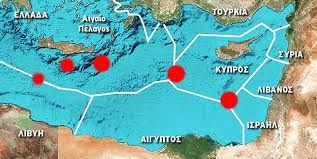
Γραφει ο Ν. Λυγερός
Στη χώρα της δημοκρατίας είναι αναπόφευκτο να έχουμε αντιφατικές απόψεις για όλα τα θέματα, διότι ο καθένας είναι ελεύθερος να εκφραστεί ακόμα και αν δεν έχει γνώσεις πάνω σε συγκεκριμένο θέμα. Έτσι ήταν αναμενόμενο τώρα που η Αποκλειστική Οικονομική Ζώνη έγινε όχι ένα φαινόμενο μόδας, αλλά ευρύτερα γνωστή στο ελληνικό γίγνεσθαι να διαβάζουμε ακόμα και κατηγορίες άμεσες ή έμμεσες ενάντια σε αυτούς που προωθούν την ελληνική ΑΟΖ και ειδικότερα στον πατέρα της, τον Θεόδωρο Καρυώτη. Βέβαια αυτό δεν πρέπει να μας ανησυχεί, διότι δεν είναι αυτές οι κριτικές που παράγουν έργο και θα αφήσουν έργο στην τελική, αλλά θεωρούμε πως είναι σημαντικό να υπερασπισθούμε την
ΑΟΖ όχι λόγω αρχών αλλά αξιών. Σε αυτή την περίπτωση πρέπει να επισημάνουμε ότι δεν είναι ο Θεόδωρος Καρυώτης που επηρεάζει την έννοια της μέσης γραμμής, όταν πρέπει να οριοθετηθούν δύο ΑΟΖ που θεωρητικά επικαλύπτονται. Και βέβαια επηρεάζει ακόμα λιγότερο τα διαγράμματα Voronoi και την τριγωνοποίηση Delaunay, διότι είναι καθαρά μαθηματικές έννοιες που δεν δέχονται καμιά τροποποίηση δίχως να εκφυλισθούν. Με άλλα λόγια, οι κριτικές πάνω σε αυτά τα σημεία όχι μόνο δεν στέκουν αλλά απλώς δεν έχουν ουσία λόγω των..
μαθηματικών και μάλιστα των καθαρών. Τώρα όσον αφορά στις κατηγορίες ενάντια στον ενθουσιασμό που προκαλεί το θέμα της ΑΟΖ, όλα εξηγούνται με τι έννοιες της ηττοπάθειας και του ραγιαδισμού. Είναι δυνατόν μετά από τόσα χρόνια μιζέριας όσον αφορά στα εθνικά θέματα να μην έχουμε άτομα που δεν μπορούν να αντιμετωπίσουν την αλήθεια και την πραγματικότητα της ΑΟΖ; Τόσα χρόνια όλοι τους εξηγούν ότι μια μικρή χώρα σαν την Ελλάδα δεν μπορεί να έχει υψηλή στρατηγική, κατά συνέπεια δέχθηκαν μια νοητική σφαλιάρα με τα επιτεύγματα της Κύπρου και με το έργο του Σόλωνα Κασσίνη και γι’ αυτό αναζητούν δικαιολογίες, διότι νιώθουν ενοχές. Άλλα άτομα βέβαια βρίσκονται πλέον σε δύσκολη θέση, διότι θεωρούν ότι το θέμα της ΑΟΖ όχι μόνο τους υποσκάπτει, αλλά τους εκθέτει με την αποτελεσματικότητά του. Πρέπει λοιπόν να ξεκαθαρίσουμε τα πράγματα και να τα ονομάσουμε με το όνομά τους. Θέλουν δεν θέλουν, η Ελλάδα μας θα έχει ΑΟΖ και η θέσπισή της θα γίνει φέτος. Θέλουν δεν θέλουν, η ελληνική ΑΟΖ θα είναι για όλους, ακόμα και για τους μίζερους, τους ηττοπαθείς και τους ραγιάδες. Θέλουν δεν θέλουν ο καθορισμός της ελληνικής ΑΟΖ θα γίνει με μαθηματικό τρόπο. Και τέλος, θέλουν δεν θέλουν η πατρίδα μας θα βγει από την κρίση μέσω της ΑΟΖ, διότι το χρωστάμε στα παιδιά μας. Όλα τα άλλα είναι λεπτομέρειες.
Το νόημα της ημέρας για το Κυπριακό Ελληνισμό.Οι λαιστρυγόνες οι Κυκλωπες και εμείς
Το νόημα της ημέρας για το Κυπριακό Ελληνισμό.Οι λαιστρυγόνες οι Κυκλωπες και εμείς
Αναρτήθηκε από τον/την olympiada στο Μαρτίου 25, 2012

Γράφει ο Μιχάλης Π.
Οι ώρες δύσκολες, οι προβλέψεις δυσοίωνες οι απόψεις απαισιόδοξες. Και ο Ελληνισμός καλείται να γιορτάσει την 25η Μαρτίου του 1821.Οι καιροί δεν επιτρέπουν λόγους ενθουσιαστικούς, πύρινους και πανηγυρικούς. Αυτοί τι στιγμή απαιτείται να αντλήσουμε ατόφιο το νόημα της ημέρας. Οι περιφρονημένοι ραγιάδες εξαντλημένοι αιματοκυλισμένοι, κερδίζουνε τελικά την ελευθερία τους. Κατορθώνουν αυτό που η λογική και ο ρεαλισμός τους, θεωρούσαν αδύνατο. Γιατί ήξεραν για πιο σκοπό πολεμούσαν. Γιατί είχαν απόλυτη σιγουριά πως βάδιζαν τον ορθό δρόμο, το δρόμο της τιμής και των εθνικών πεπρωμένων. Γιατί ουδέποτε συζήτησαν αν τους συμφέρει υλικά ή όχι ο πόλεμος για τη λευτεριά. Γιατί ουδέποτε διανοήθηκαν πως είναι δυνατό η υλική ευδαιμονία να αποτελέσει ισάξιο υποκατάστατο της ελευθερίας. Γιατί τέλος ουδέποτε δίστασαν να προσφέρουν και τις περιουσίες τους και τη ζωή τους την ίδια στον αγώνα για την ελευθερία.
Η ΑΠΩΛΕΙΑ ΤΟΥ ΙΕΡΟΥ
Sunday, March 25, 2012 1:14 PM
Ἀναγράφω... - Η απώλεια του Ιερού |  |
| Όταν η έννοιες του θανάτου και της ζωής ρωτούν η μία την άλλη. Όταν ο θάνατος είναι εορτή της ζωής, και η ζωή εορτή του θανάτου. |
«Μάχου υπέρ Πίστεως και Πατρίδος»
«Μάχου υπέρ Πίστεως και Πατρίδος»
Αναρτήθηκε από τον/την olympiada στο Μαρτίου 25, 2012
«Πουλάς Ελλάδα, Μακρυγιάννη»;! ΟΤΑΝ ΟΙ ΕΛΛΗΝΕΣ ΕΛΕΓΑΝ ΟΧΙ ΤΑ ΘΕΡΙΑ ΓΙΝΟΝΤΑΝ ΑΡΝΙΑ ΚΑΙ ΟΙ ΦΡΑΓΚΟΙ ΥΠΟΚΛΙΝΟΝΤΑΝ!!!
«Πουλάς Ελλάδα, Μακρυγιάννη»;! ΟΤΑΝ ΟΙ ΕΛΛΗΝΕΣ ΕΛΕΓΑΝ ΟΧΙ ΤΑ ΘΕΡΙΑ ΓΙΝΟΝΤΑΝ ΑΡΝΙΑ ΚΑΙ ΟΙ ΦΡΑΓΚΟΙ ΥΠΟΚΛΙΝΟΝΤΑΝ!!!
Αναρτήθηκε από τον/την olympiada στο Μαρτίου 25, 2012
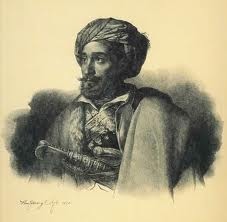 Γράφει η Σοφία Τ.
Γράφει η Σοφία Τ.Αφιερωμένα ολίγα λόγια από τα ΑΠΟΜΝΗΜΟΝΕΥΜΑΤΑ του. Συγγνώμη στρατηγέ, συγγνώμη σ’ ΟΛΟΥΣ όσους πολέμησαν και η Πολιτεία τους έκανε ζητιάνους και τίποτα… Συγγνώμη που το ξεπούλημα πάει σύννεφο και οι Τούρκοι κάνουν βόλτες στο Αιγαίο σα πλοίο της γραμμής το καλοκαίρι!
«…Τότε, εκεί που καθόμουν εις το περιβόλι μου και έτρωγα ψωμί, πονώντας από τις πληγές, όπου έλαβα εις τον αγώνα και περισσότερο πονώντας δια τις μέσα πληγές όπου δέχομαι δια τα σημερινά δεινά της Πατρίδος, ήλθαν δύο επιτήδειοι, άνθρωποι των γραμμάτων, μισομαθείς και άθρησκοι, και μου ξηγώνται έτσι: «Πουλάς Ελλάδα, Μακρυγιάννη».
Εγώ, στην άθλιαν κατάστασίν μου, τους λέγω: «Αδελφοί, με αδικείτε. Ελλάδα δεν πουλάω,
νοικοκυραίγοι μου.Τέτοιον αγαθόν πολυτίμητον δεν έχω εις την πραμάτειαν μου. Μα και να τό’ χα, δεν τό’ δινα κανενός. Κι’ αν πουλιέται Ελλάδα, δεν αγοράζεται σήμερις, διότι κάνατε τον κόσμον εσείς λογιώτατοι, να μην θέλει να αγοράσει κάτι τέτοιο».
…Πατρίδα να θυμάσαι εσύ αυτούς όπου, δια την τιμήν και την λευτερίαν σου, δεν λογάριασαν θάνατο και βάσανα. Κι’ αν εσύ τους λησμονήσεις, θα τους θυμηθούν οι πέτρες και τα χώματα, όπου έχυσαν αίματα και δάκρυα.
Όταν ο Στρατηγός Μακρυγιάννης βρισκόταν στους Μύλους με τα παλικάρια του και προπαρασκευάζονταν για τη μάχη με τον Ιμπραήμ, τον επισκέφτηκε ο Ναύαρχος Δεριγνί.-Τι κάνετε αυτού; Ρωτά το Στρατηγό.
-Εδώ θα σταματήσουμε το Μπραήμι, απαντά ο Μακρυγιάννης.
-Με μια χούφτα άνδρες;
-Μπορεί να είμαστε λίγοι κι αδύναμοι, μα έχουμε μαζί μας τον Παντοδύναμο Θεό και θα νικήσουμε!!!
-Τρεμπιέν.(Πολύ καλά), απάντησε ο Δεριγνί.
Τον καιρό που ο Κολοκοτρώνης ήταν με το «Μαύρο Στόλο» κι είχε γίνει ο φόβος και ο τρόμος των κουρσάρων στο Αιγαίο, έζησε καινούργια στέρηση και κινδύνους που τον ατσάλωσαν. Κάποτε που έμεινε μέρες χωρίς να φουμάρει, έσκισε το τσιμπούκι του, έξισε τη νικοτίνη από μέσα κι έφτιαξε μ’ αυτή τσιγάρο. Το αηδίασε:
-Όρσε μωρέ άνθρωπος, φώναξε, που θέλει να λευτερώσει τον τόπο του και δεν μπορεί να λευτερωθει ο ίδιος από ένα συνήθιο. Θεέ μου συγχώραμε.
Πέταξε το τσιμπούκι και το τσιγάρο στη θάλασσα κι από τότε δεν ξανακάπνισε
«Εκεί οπούφκιαχνα τις θέσες εις τους Μύλους(Κοντά στο Ναύπλιο) ήρθε ο Ντερνύς (Derigny Anri Gautier, Γάλλος ναύαρχος) να με ιδή. Μου λέγει. «Τι κάνεις αυτού; Αυτές οι θέσεις είναι αδύνατες. Τι πόλεμον θα κάνετε με τον Μπραϊμη αυτού;» – Του λέγω, είναι αδύνατες οι θέσεις κι’ εμείς, όμως είναι δυνατός ο θεός όπου μας προστατεύει. Και θα δείξωμεν την τύχη μας σ’ αυτές τις θέσεις τις αδύνατες. Κι αν είμαστε ολίγοι εις το πλήθος του Μπραϊμη, παρηγοριόμαστε μ’ ένα τρόπον, ότι η τύχη μας έχει τους Έλληνες πάντοτε ολίγους. Ότι αρχή και τέλος, παλαιόθεν και ως τώρα, όλα τα θεριά πολεμούν να μας φάνε και δεν μπορούνε. Τρώνε από μας και μένει και μαγιά. Και οι ολίγοι αποφασίζουν να πεθάνουν. Κι όταν κάνουν αυτήνη την απόφασιν, λίγες φορές χάνουν και πολλές κερδαίνουν» «Τούτη την πατρίδα την έχομεν όλοι μαζί, και σοφοί κι αμαθείς, και πλούσιοι και φτωχοί, και πολιτικοί και στρατιωτικοί, και οι πλέον μικρότεροι άνθρωποι. Όσοι αγωνιστήκαμεν, αναλόγως ο καθείς, έχομεν να ζήσομεν εδώ. Το λοιπόν δουλέψαμεν όλοι μαζί να τη φυλάμε κι όλοι μαζί, και να μη λέγει ούτε ο δυνατός «εγώ», ούτε ο αδύνατος. Ξέρετε πότε να λέγει ο καθείς «εγώ»; όταν αγωνιστεί μόνος του και φκιάσει ή χαλάσει, να λέγει «εγώ» Όταν όμως αγωνίζονται πολλοί και φκιάνουν, τότε να λέμε «εμείς». Είμαστε στο «εμείς»κι όχι στο «εγώ».»
«Και λευτερωθήκαμεν από τους Τούρκους και σκλαβωθήκαμεν εις ανθρώπους κακορίζικους, όπου ήταν η ακαθαρσία της Ευρώπης.»
«Είχα δυο αγάλματα περίφημα, μια γυναίκα κι ένα βασιλόπουλο, ατόφια – φαίνονταν οι φλέβες, τόση εντέλειαν είχαν. Όταν χάλασαν τον Πόρο, τα΄ χαν πάρει κάτι στρατιώτες, και στ΄ Άργος θα τα πουλούσαν κάτι Ευρωπαίων· χίλια τάλαρα γύρευαν… Πήρα τους στρατιώτες, τους μίλησα: Αυτά, και δέκα χιλιάδες τάλαρα να σας δώσουνε, να μην το καταδεχτείτε να βγουν από την πατρίδα μας. Γι΄ αυτά πολεμήσαμε»
Το τελευταίο μέρος των ΑΠΟΜΝΗΜΟΝΕΥΜΑΤΩΝ αφιερώνεται σε λακέδες Μ. Δυνάμεων, σαν τον Κωλέττη τότε και σαν τους τωρινούς…
«Ἤρθετε ἐσεῖς οἱ μεγάλοι μας πολιτικοὶ νὰ μᾶς λευτερώσετε, ὅταν σηκώσαμεν τὴν ἐπανάστασιν μόνοι μας κι᾿ ἀγωνιζόμαστε τῆς πρῶτες χρονιὲς μὲ τοὺς σημαντικούς της πατρίδος μας πολιτικοὺς – φαίνεται ὁ ἀγώνας ἐκεῖνος κι᾿ ὁ πατριωτισμὸς καὶ ἡ ἀδερφοσύνη ὁποῦ ῾χαμεν ἀναμεταξύ μας. Ὅταν κοπιάσετε ἐσεῖς, μᾶς γυμνάσετε τὴν διχόνοια, μᾶς φέρατε τῆς φατρίες καὶ τ᾿ ἄλλα τ᾿ ἀγαθά· καὶ κακοβάλετε τὸ δυστυχησμένο ἀθῶον ἔθνος.»
ΜΙΑ ΕΠΙΣΤΟΛΗ ΤΟΥ ΚΟΛΟΚΟΤΡΩΝΗ ΠΟΥ ΜΙΛΑ ΓΙΑ ΤΙΣ ”ΑΝΑΓΚΕΣ” ΤΟΥ
ΜΙΑ ΕΠΙΣΤΟΛΗ ΤΟΥ ΚΟΛΟΚΟΤΡΩΝΗ ΠΟΥ ΜΙΛΑ ΓΙΑ ΤΙΣ ”ΑΝΑΓΚΕΣ” ΤΟΥ .
Αναρτήθηκε από τον/την olympiada στο Μαρτίου 25, 2012
 <> *
<> *Μεγάλη γάτα ο Γέρος του Μοριά, ποτέ δεν έπεσε έξω στην ζωή του… Μετά από τέσσερα χρόνια , το 1825 , τον περνάγανε αλυσοδεμένο από την πλατεία του Ναυπλίου , για να πάνε να τον φυλακίσουν στην Ύδρα . Εκεί βρισκόταν μαζεμένο πλήθος «πατριωτών» , που τον γιουχάιζε ,τον έφτυνε και ορμούσε να τον λιντσάρει.
Έπρεπε να μπουκάρει ο Ιμπραήμ για να τον αποφυλακίσουν οι τότε χαρτογιακάδες και πολιτικάντηδες της εποχής , ώστε να σώσει το έθνος – και αυτούς μαζί – για δεύτερη φορά μετά τον Δράμαλη.
Παναγιώτης Ζωγράφος : Ο Ζωγράφος της Επανάστασης του 1821
Παναγιώτης Ζωγράφος : Ο Ζωγράφος της Επανάστασης του 1821
Αναρτήθηκε από τον/την filotimiamirror στο Μαρτίου 25, 2012
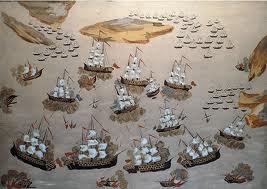 Λαϊκός ζωγράφος, απλός και ταπεινός, χωρίς ειδικές σπουδές στη ζωγραφική, ίσως να περνούσε απαρατήρητος και να έσβηνε μέσα στην ανωνυμία, αν δεν τον έβγαζε από αυτήν ο Μακρυγιάννης. Αγωνιστής και ο ίδιος της επανάστασης του 1821, ο Παναγιώτης Ζωγράφος, ήταν αυτός που απέδωσε ζωγραφικά τις αναμνήσεις του Στρατηγού.Βιογραφικές πληροφορίες για τον Παναγιώτη Ζωγράφο σπανίζουν.
Λαϊκός ζωγράφος, απλός και ταπεινός, χωρίς ειδικές σπουδές στη ζωγραφική, ίσως να περνούσε απαρατήρητος και να έσβηνε μέσα στην ανωνυμία, αν δεν τον έβγαζε από αυτήν ο Μακρυγιάννης. Αγωνιστής και ο ίδιος της επανάστασης του 1821, ο Παναγιώτης Ζωγράφος, ήταν αυτός που απέδωσε ζωγραφικά τις αναμνήσεις του Στρατηγού.Βιογραφικές πληροφορίες για τον Παναγιώτη Ζωγράφο σπανίζουν. Η σημαντική μάχη των Μύλων (13 Ιουνίου 1825)
Η σημαντική μάχη των Μύλων (13 Ιουνίου 1825)
Αναρτήθηκε από τον/την olympiada στο Μαρτίου 25, 2012
– Οι Έλληνες νικούν για πρώτη φορά τον Ιμπραήμ λίγο έξω από το Ναύπλιο
Ο σοβαρότερος κίνδυνος κατάπνιξης της Ελληνικής επανάστασης προήλθε από την επέμβαση του οργανωμένου τακτικού Αιγυπτιακού στρατού υπό τον ικανό και έξυπνο στρατηγό Ιμπραήμ. Με περιπετειώδη τρόπο ο Ιμπραήμ κατάφερε να αποβιβάσει 4000 άνδρες, πυροβολικό και ιππείς στο Νεόκαστρο στις 26 Φεβρουαρίου 1825. Ο στρατός και το ηθικό των Ελλήνων βρίσκονταν στο χειρότερο δυνατό σημείο μετά από δύο σκληρούς εμφυλίους πολέμους, την λεηλασία της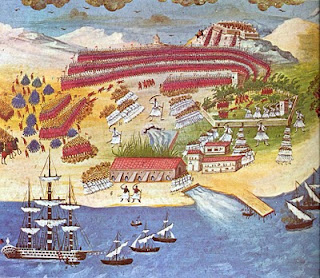 |
| Αναπαράσταση της μάχης των Μύλων |
Η ΜΕΓΑΛΗ ΕΞΟΔΟΣ
Η ΜΕΓΑΛΗ ΕΞΟΔΟΣ
Αναρτήθηκε από τον/την olympiada στο Μαρτίου 25, 2012
«Τις ημέρες εκείνες έκαναν σύναξη μυστική τα παιδιά και λάβανε την απόφαση, επειδή τα κακά μαντάτα πλήθαιναν στην πρωτεύουσα, να βγουν έξω σε πλατείες με το μόνο πράγμα που τους είχε απομείνει: μια παλάμη τόπο κάτω από τ’ ανοιχτό πουκάμισο, με τις μαύρες τρίχες και το σταυρουδάκι του ήλιου.
Ο Έλληνας δὲ χάνει τὴν ἐθνικὴ πυξίδα του..
Ο Έλληνας δὲ χάνει τὴν ἐθνικὴ πυξίδα του..
Αναρτήθηκε από τον/την exomatiakaivlepo στο Μαρτίου 25, 2012
Ό Ἕλληνας δὲ
χάνει τὴν ἐθνικὴ πυξίδα του. Δὲν ἀποπροσανατολίζεται. Δὲ χάνει τὴ
γενιά του σὲ πεῖσμα τοῦ χώρου καὶ τοῦ πανδαμάτορα χρόνου. Ἀκλόνητος
κυματοθραύστης στὴ θύελλα καὶ στὸ βοριά, θεριεύει στὰ βάθη τῆς ψυχῆς
του ἡ ἀκλόνητη πίστη στοὺς θρύλους καὶ στὶς παραδόσεις, στὰ παλιὰ
τρόπαια τῆς φυλῆς. Αὐτὴ ζωντανεύει τὰ ὄνειρά του, περισαρκώνει τοὺς
ὁραματισμοὺς καὶ τρέφει τοὺς καημούς του.
χάνει τὴν ἐθνικὴ πυξίδα του. Δὲν ἀποπροσανατολίζεται. Δὲ χάνει τὴ
γενιά του σὲ πεῖσμα τοῦ χώρου καὶ τοῦ πανδαμάτορα χρόνου. Ἀκλόνητος
κυματοθραύστης στὴ θύελλα καὶ στὸ βοριά, θεριεύει στὰ βάθη τῆς ψυχῆς
του ἡ ἀκλόνητη πίστη στοὺς θρύλους καὶ στὶς παραδόσεις, στὰ παλιὰ
τρόπαια τῆς φυλῆς. Αὐτὴ ζωντανεύει τὰ ὄνειρά του, περισαρκώνει τοὺς
ὁραματισμοὺς καὶ τρέφει τοὺς καημούς του.
Μοίρα του Έλληνα ο Αγώνας και η Αντίσταση
Μοίρα του Έλληνα ο Αγώνας και η Αντίσταση
Αναρτήθηκε από τον/την olympiada στο Μαρτίου 25, 2012

Του Δημήτρη Αλευρομάγειρου, Αντιστράτηγου ε.α., Επίτιμου Γενικού Επιθεωρητού Στρατού
«….Αλλά, πόσας φοράς πρέπει να εκφωνήσω, ότι η Ελευθερία είναι αναγκαιοτέρα και από την ίδιαν την ύπαρξιν εις τον άνθρωπον! Αυτή γαρ αποκαταστεί γλυκείαν την ζωήν, αυτή γεννά διαυθεντευτάς της Πατρίδος, αυτή νομοδότας, αυτή εναρέτους, αυτή σοφούς, αυτή τεχνίτας και , αυτή μόνον, τέλος πάντων, τιμά την ανθρωπότητα…»
Greek military ranks
Greek military ranks
From Wikipedia, the free encyclopedia
Jump to: navigation, search
Modern Greek military ranks are based on Ancient Greek & Byzantine terminology, even though the ranks correspond to those of other Western armies. For example, ancient hoplite unit of approximately 100 men, the lochos, is today the name for a company of soldiers; its commander, as in ancient times, is a lochagos, while his lieutenants are called ypolochagoi - literally, "sub-captains" - a modern neologism. A sergeant is known as a lochias. A tagmatarchis (major) commands a tagma (battalion) and so forth. Thus, every officer or non-commissioned officer is in the land and air forces is generally named after the type of unit he commands, with the suffix -agos (from agein, "to lead") or -archos / arches (from archein, "to rule").
«Ξύρισαν» την τουρκική φρεγάτα δύο ελληνικά Μirage 2000!
Σάββατο, 24 Μαρτίου 2012
«Ξύρισαν» την τουρκική φρεγάτα δύο ελληνικά Μirage 2000!
Πάνω από κεφάλια των Τούρκων ναυτικών της φρεγάτας Γκαζιέντεπ (GAZIANTEP), στα 1.300 μέτρα, πέταξαν δύο ελληνικά μαχητικά Μιράζ 2000, όταν βρισκόταν εντός των ελληνικών υδάτων, κατά την προκλητική της πορεία από την Κύθνο μέχρι το στενό του Καφηρέα. Η κίνηση αυτή, παράλληλα με την παρακολούθηση του σκάφους από την φρεγάτα Θεμιστοκλής και τα επάκτια ραντάρ, αποφασίστηκε από τον Αρχηγό ΓΕΕΘΑ στρατηγό Κωσταράκο ως μια τακτική κίνηση επίδειξης στρατιωτικής παρουσίας.
Η τουρκική φρεγάτα “GAZIANTEP”, εξερχόμενη από το λιμάνι του Ακσάζ από την Πέμπτη και πλέοντας σε διεθνή ύδατα, εισήλθε σήμερα 24 Μαρτίου (στις 06:30) σε Ελληνικά Xωρικά Ύδατα νότια της Κύθνου και εξήλθε αυτών με βορειοανατολική πορεία πλέοντας, στις 10:00, μέσω του στενού του Καφηρέα. Τώρα είναι στο κεντρικό Αιγαίο με πιθανή κατεύθυνση τα Στενά του Βοσπόρου.
Μέσα και πλοία του Πολεμικού Ναυτικού, καθώς και αεροσκάφη της Πολεμικής Αεροπορίας, παρακολουθούν το τουρκικό σκάφος, καθόλη τη διάρκεια του πλου του.
http://www.prionokordela.gr/
Η τουρκική φρεγάτα “GAZIANTEP”, εξερχόμενη από το λιμάνι του Ακσάζ από την Πέμπτη και πλέοντας σε διεθνή ύδατα, εισήλθε σήμερα 24 Μαρτίου (στις 06:30) σε Ελληνικά Xωρικά Ύδατα νότια της Κύθνου και εξήλθε αυτών με βορειοανατολική πορεία πλέοντας, στις 10:00, μέσω του στενού του Καφηρέα. Τώρα είναι στο κεντρικό Αιγαίο με πιθανή κατεύθυνση τα Στενά του Βοσπόρου.
Μέσα και πλοία του Πολεμικού Ναυτικού, καθώς και αεροσκάφη της Πολεμικής Αεροπορίας, παρακολουθούν το τουρκικό σκάφος, καθόλη τη διάρκεια του πλου του.
http://www.prionokordela.gr/
Απελευθέρωση της Θεσσαλίας-Αρτας (1881-2011) -Σάτιρα και Πολιτική
Σάββατο, 24 Μαρτίου 2012
Απελευθέρωση της Θεσσαλίας-Αρτας (1881-2011) -Σάτιρα και Πολιτική
της Ελίνας Γαληνού
Στη δεκαετία 1870-80, εμφανίζεται έξαρση εθνικοαπελευθερωτικής κίνησης των βαλκανικών λαών. Τα κινήματα αυτά ενθαρρύνονται με την κήρυξη του πολέμου από τη Ρωσία στην Τουρκία και ιδίως, μετά την υπογραφή της Συνθήκης της Αδριανούπολης το 1878, όπου η εδαφική ακεραιότητα της Οθωμανικής Αυτοκρατορίας, δέχεται πλήγμα
Στη δεκαετία 1870-80, εμφανίζεται έξαρση εθνικοαπελευθερωτικής κίνησης των βαλκανικών λαών. Τα κινήματα αυτά ενθαρρύνονται με την κήρυξη του πολέμου από τη Ρωσία στην Τουρκία και ιδίως, μετά την υπογραφή της Συνθήκης της Αδριανούπολης το 1878, όπου η εδαφική ακεραιότητα της Οθωμανικής Αυτοκρατορίας, δέχεται πλήγμα
Ναυμαχία της Σαλαμίνας: Ενα μελτέμι ήταν η αιτία
Ναυμαχία της Σαλαμίνας: Ενα μελτέμι ήταν η αιτία
Πώς εκμεταλλεύθηκαν οι Ελληνες τα καιρικά φαινόμενα στη διάρκεια της ναυμαχίας της Σαλαμίνας.
Ο ακαδημαϊκός κ. Χρήστος Ζερεφός το μελέτησε και εξηγεί
Μαρία Θερμού
Με το πρώτο φως της ημέρας φάνηκε ότι όλοι ήταν έτοιμοι. Από τα μεγάλα πλοία τους οι Πέρσες κοιτούσαν αφ' υψηλού τα ολιγάριθμα ελληνικά σκάφη απέναντί τους. Μόλις είχαν εισέλθει στα στενά και, όπως λέει ο Αισχύλος, προτού καν δουν τους Ελληνες, είχαν ακούσει το πολεμικό τραγούδι τους. Η μάχη άρχιζε και ο Ξέρξης από το Αιγάλεω είχε πάρει από νωρίς θέση.
Ο ακαδημαϊκός κ. Χρήστος Ζερεφός το μελέτησε και εξηγεί
Μαρία Θερμού
Με το πρώτο φως της ημέρας φάνηκε ότι όλοι ήταν έτοιμοι. Από τα μεγάλα πλοία τους οι Πέρσες κοιτούσαν αφ' υψηλού τα ολιγάριθμα ελληνικά σκάφη απέναντί τους. Μόλις είχαν εισέλθει στα στενά και, όπως λέει ο Αισχύλος, προτού καν δουν τους Ελληνες, είχαν ακούσει το πολεμικό τραγούδι τους. Η μάχη άρχιζε και ο Ξέρξης από το Αιγάλεω είχε πάρει από νωρίς θέση.
25 mars 1821, indépendance de la Grèce
Κυριακή, 25 Μαρτίου 2012
25 mars 1821, indépendance de la Grèce
Amicale Francophone des Amis de Syros
Le 25 mars n’est pas seulement un jour férié, prétexte à un long week-end chômé. C’est avant tout la célébration de l’indépendance grecque. Retour sur un événement fondateur de l'identité nationale
 La Grèce est l’un des rares pays au monde à posséder deux fêtes nationales. Le 28 octobre qui célèbre le refus des grecs d’autoriser Mussolini à utiliser leur pays comme base militaire. Un NON vigoureux qui a précipité l’entrée de la Grèce dans la guerre en 1941.
La Grèce est l’un des rares pays au monde à posséder deux fêtes nationales. Le 28 octobre qui célèbre le refus des grecs d’autoriser Mussolini à utiliser leur pays comme base militaire. Un NON vigoureux qui a précipité l’entrée de la Grèce dans la guerre en 1941.Et puis le 25 mars, début de l’insurrection grecque contre l’empire Ottoman.
Le 25 avril 1821, l’archevêque de Patras Germanos, figure mythique de la révolution grecque, proclama la guerre de libération nationale. En réalité, le soulèvement était déjà commencé depuis le 15 mars sur toute la côte ouest du Péloponnèse mais la date du 25 a été symboliquement retenue car elle coïncidait avec le jour de l’annonciation à la vierge (Evangelismos), fête très importante dans le calendrier orthodoxe.
Σάββατο 24 Μαρτίου 2012
Η ΠΙΣΤΗ ΤΩΝ ΕΛΕΥΘΕΡΩΝ ΠΟΛΙΟΡΚΗΜΕΝΩΝ
Η ΠΙΣΤΗ ΤΩΝ ΕΛΕΥΘΕΡΩΝ ΠΟΛΙΟΡΚΗΜΕΝΩΝ
Αναρτήθηκε από τον/την olympiada στο Μαρτίου 24, 2012
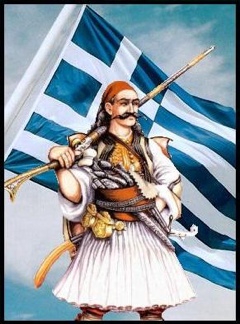
Γράφει ο Κωνσταντῖνος Χολέβας-Πολιτικός Ἐπιστήμων
Δέν εἶναι τυχαῖο ὅτι ἡ Ἔξοδος τοῦ Μεσολογγίου ἔγινε τήν Κυριακή τῶν Βαΐων τοῦ 1826. Ἡ πίστη στόν Θεό, ἡ παρουσία τοῦ Ὀρθοδόξου Κλήρου καί ἡ ἑλληνορθόδοξη παράδοση πού ἦταν ἔμφυτη στούς ἀγωνιστές διεδραμάτισαν συμβολικό καί συνάμα οὐσιαστικό ρόλο στή μεγάλη αὐτή στιγμή τοῦ Νεωρτέρου Ἑλληνισμοῦ. Ὁ Κοζανίτης λόγιος καί ὁπλαρχηγός Νικόλαος Κασομούλης περιγράφει ὡς ἑξῆς τήν πίστη τῶν πολιορκημένων Μεσολογγιτῶν στή Θεία Πρόνοια:
Διηνέκης ο Λακεδαιμόνιος
Αναρτήθηκε από τον/την olympiada στο Μαρτίου 24, 2012
Ο Διηνέκης ήταν ένας από τους 300 Σπαρτιάτες που έλαβαν μέρος στη μάχη των Θερμοπυλών το 480 π.Χ. υπό τον βασιλιά Λεωνίδα.

Ο Διηνέκης έμεινε γνωστός εξαιτίας της απάντησης του «καλύτερα, θα πολεμήσουμε υπό σκιά», όταν κάποιος παρατήρησε ότι οι Πέρσες είναι τόσοι πολλοί ώστε τα βέλη τους θα σκέπαζαν τον ήλιο.
Η φράση αυτή έμελλε να γίνει συνώνυμη της ανδρείας, της τόλμης και της περιφρόνησης του θανάτου, μιας και αυτός όταν έρχεται στο πεδίο της μάχης, τιμημένα, αποτελεί το ύψιστο ιδανικό κάποιου για τη χώρα – πόλη του.
Η τελευταία νύχτα στο Μανιάκι….
Η τελευταία νύχτα στο Μανιάκι….
Αναρτήθηκε από τον/την olympiada στο Μαρτίου 24, 2012
 ένα ιστορικό αφήγημα
ένα ιστορικό αφήγημαΓράφει ο ΑΠΕΛΛΗΣ
Η φωτιά έκαιε μέσα στη νύχτα, φωτίζοντας με τις αναλαμπές της τα σιωπηλά πρόσωπα των παλικαριών που κάθονταν τριγύρω της. Πιο πέρα άναβαν και άλλες φωτιές με καθισμένες φιγούρες και σκιές που πηγαινοέρχονταν. Μόλις είχαν τελειώσει το φαγητό και οι λιγοστές φλάσκες με το κρασί πήγαιναν από χέρι σε χέρι. Δεν άκουγες συνομιλίες, παρά μόνο το κριτσάνισμα της φωτιάς και μια φλογέρα που σύριζε έναν ρυθμό ποιμενικό, αρχαίο.
Οι θρησκευτικές ανάγκες των μουσουλμάνων και οι “αυτόχθονες”
Οι θρησκευτικές ανάγκες των μουσουλμάνων και οι “αυτόχθονες”
Αναρτήθηκε από τον/την olympiada στο Μαρτίου 24, 2012
Kαλησπέρα σας.
Επειδή γίνεται αρκετός θόρυβος τώρα τελευταία με τις “θρησκευτικές ανάγκες”των μουσουλμάνων στη χώρα μας, σας στέλνω ένα link που αλίευσα στο διαδίκτυο. Είναι χαρακτηριστική η σύγχυση που κυριαρχεί , αλλά και σκοπίμως καλλιεργείται. Αποστέλλω επίσης και ένα σχόλιο-άρθρο δικό μου.
http://www.ecclesia.gr/greek/holysynod/commitees/metanastes/parousiasi_11062011.pdf
Ακολουθεί σχόλιο-άρθρο δικό μου.
ΟΙ ΘΡΗΣΚΕΥΤΙΚΕΣ ΑΝΑΓΚΕΣ ΤΩΝ ΜΟΥΣΟΥΛΜΑΝΩΝ ΚΑΙ ΟΙ“ΑΥΤΟΧΘΟΝΕΣ”
Τελικά στο διαδίκτυο βρίσκει κανείς τα πιο απίθανα στοιχεία. Τι ανακάλυψα; Στο site της Διοίκησης της Εκκλησίας της Ελλάδος, υπάρχει link που παραπέμπει στην εισήγηση της κ. Ευαγγελίας Δουρίδα – επιστημονικής συνεργάτιδος του Κ.Σ.Π.Μ. (Κέντρο Στήριξης Παλινοστούτων Μεταναστών)- “Συνοπτική παρουσίαση του σχεδίου δράσης : ΑΝΑΖΗΤΩΝΤΑΣ ΤΡΟΠΟΥΣ ΣΥΝΥΠΑΡΞΗΣ” (με τους μουσουλμάνους εννοείται). Η εισήγηση της κ. Δουρίδα έγινε στο πλαίσιο της ημερίδας “Το Ισλάμ στην Ελλάδα : θρησκευτική ταυτότητα και πρακτικήμεταξύ αυτοχθόνων και μουσουλμάνων μεταναστών”
Επειδή γίνεται αρκετός θόρυβος τώρα τελευταία με τις “θρησκευτικές ανάγκες”των μουσουλμάνων στη χώρα μας, σας στέλνω ένα link που αλίευσα στο διαδίκτυο. Είναι χαρακτηριστική η σύγχυση που κυριαρχεί , αλλά και σκοπίμως καλλιεργείται. Αποστέλλω επίσης και ένα σχόλιο-άρθρο δικό μου.
http://www.ecclesia.gr/greek/holysynod/commitees/metanastes/parousiasi_11062011.pdf
Ακολουθεί σχόλιο-άρθρο δικό μου.
ΟΙ ΘΡΗΣΚΕΥΤΙΚΕΣ ΑΝΑΓΚΕΣ ΤΩΝ ΜΟΥΣΟΥΛΜΑΝΩΝ ΚΑΙ ΟΙ“ΑΥΤΟΧΘΟΝΕΣ”
Τελικά στο διαδίκτυο βρίσκει κανείς τα πιο απίθανα στοιχεία. Τι ανακάλυψα; Στο site της Διοίκησης της Εκκλησίας της Ελλάδος, υπάρχει link που παραπέμπει στην εισήγηση της κ. Ευαγγελίας Δουρίδα – επιστημονικής συνεργάτιδος του Κ.Σ.Π.Μ. (Κέντρο Στήριξης Παλινοστούτων Μεταναστών)- “Συνοπτική παρουσίαση του σχεδίου δράσης : ΑΝΑΖΗΤΩΝΤΑΣ ΤΡΟΠΟΥΣ ΣΥΝΥΠΑΡΞΗΣ” (με τους μουσουλμάνους εννοείται). Η εισήγηση της κ. Δουρίδα έγινε στο πλαίσιο της ημερίδας “Το Ισλάμ στην Ελλάδα : θρησκευτική ταυτότητα και πρακτικήμεταξύ αυτοχθόνων και μουσουλμάνων μεταναστών”
Μην ξεχνάτε.ΔΙΑΒΑΣΕ ΤΟ. Αυτά έκαναν οι Έλληνες στην Αντίσταση. Δείτε τι δήλωσαν άλλοι για εμάς
Μην ξεχνάτε.ΔΙΑΒΑΣΕ ΤΟ. Αυτά έκαναν οι Έλληνες στην Αντίσταση. Δείτε τι δήλωσαν άλλοι για εμάς
Αναρτήθηκε από τον/την olympiada στο Μαρτίου 24, 2012
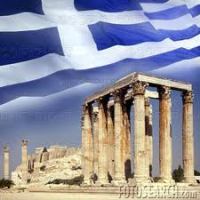
Είναι αλήθεια ότι οι Έλληνες έχουν προσφέρει πλείστα όσα παραδείγματα γενναιότητας και αντίστασης από την αρχαιότητα έως σήμερα. Είτε ήταν οι πέρσες, είτε οι βάρβαροι, οι οθωμανοί ή οι ιταλοί και οι γερμανοί, οι Έλληνες αντιστάθηκαν και έδωσαν τρανό παράδειγμαθάρους και γενναιότητας
Τον τελευταίο καιρό, κάποια παπαγαλάκια και αυτοί που υπέστησαν την μεγάλη ήττα κατά τον πόλεμο του 40, έχουν βαλθεί να μας πείσουν ότι είμαστε μαλθακοί, χωρίς ίχνος αντίστασης σε αυτά που οι ξένες δυνάμεις μαζί με τους γνήσιους απογόνους των ταγματασφαλιτών και των δωσίλογων επιβουλεύονται για τη πατρίδα μας. Αδέλφια μην ξεχνάτε το DNA μας.
ΒΥΖΑΝΤΙΝΑ ΟΙΚΟΣΗΜΑ
 |
| ΠΟΛΥ ΕΝΔΙΑΔΕΡΟΝΤΑ ΙΕΡΑΛΔΙΚΑ ΣΥΜΒΟΛΑ (ΣΥΜΠΤΩΜΑΤΙΚΑ ΜΟΥ ΑΡΕΣΑΝ ΑΠΟ ΜΙΚΡΗ ΗΛΙΚΙΑ) ΑΝ ΚΑΙ ΟΡΙΣΜΕΝΑ ΔΕΙΧΟΝΟΥΝ ΔΥΤΚΗ ΕΠΙΡΠΟΗ ΟΠΩΕ ΤΟ FLEUR-DE-LIS (ΣΤΗΝ ΙΕΡΑΛΔΙΚΗ ΣΥΜΒΟΛΟ ΤΗΣ FRANCE MODERNE) O "lION RAMBRANT (BOYRGOGNE-ΒΟΥΡΓΟΥΝΔΙΑ),ΟΙ Προσθήκη λεζάντας |
Μέρες που είναι, ας φανταστούμε τι θα γινόταν αν υπήρχε … MEGA τον καιρό του ΄21 (ας πούμε πχ βραδινό δελτίο μετά την εισβολή του Ιμπραήμ στον Μωριά):
Παρασκευή, 23 Μαρτίου 2012
Μέρες που είναι, ας φανταστούμε τι θα γινόταν αν υπήρχε … MEGA τον καιρό του ΄21 (ας πούμε πχ βραδινό δελτίο μετά την εισβολή του Ιμπραήμ στον Μωριά):
 Τρέμη: «Και ενώ η παγκόσμια κατάσταση είναι τόσο δύσκολη, υπάρχουν ακόμα κάποιοι αμετανόητοι που εξακολουθούν να στεναχωρούν τον πολυχρονεμένο μας σουλτάνο, που ο γιαραμπής να μας κόβει χρόνια και να του δίνει μέρες».
Τρέμη: «Και ενώ η παγκόσμια κατάσταση είναι τόσο δύσκολη, υπάρχουν ακόμα κάποιοι αμετανόητοι που εξακολουθούν να στεναχωρούν τον πολυχρονεμένο μας σουλτάνο, που ο γιαραμπής να μας κόβει χρόνια και να του δίνει μέρες».Πρετεντέρης: «Όχι μόνο αυτό Όλγα. Ενώ όλες οι υγιείς δυνάμεις του τόπου, κοτζαμπάσηδες - δεσποτάδες - καραβοκύρηδες έχουν πλέον αντιληφθεί πως η χώρα χρειάζεται ηρεμία και ανάπτυξη γιατί αλλιώς οι Οθωμανοί θα σηκωθούν... να φύγουν και θα μας αφήσουν μόνους μας, αυτοί οι αλιτήριοι κατσαπλιάδες, αυτές οι μειοψηφίες έχουν το θράσος να απειλούν τους νοικοκυραίους».
Heptanesa (1983: Doomsday)
Heptanesa (1983: Doomsday)
| |||||||
| Capital: | Corfu | ||||||
| Largest city: | Ioannina | ||||||
| Other cities: | Sarande, Argostoli | ||||||
| Language: official: | Greek | ||||||
| others: | Albanian, Italian | ||||||
| Doge: | Spyros Troianos | ||||||
| First Minister: | Sotirios Micallef | ||||||
| Area: | approx. 19,200 km² | ||||||
| Population: | approx. 793,000 | ||||||
| Admission: | Founding Member of the Confederation of Greece: 1994, Statehood in Greek Federation: 2009 | ||||||
Contents[show] |
History Edit
Edit
Pre-Doomsday Edit
Edit
The islands were settled by Greeks at an early date, possibly as early as 1200 BC, and certainly by the 9th century BC. By the 4th century BC, most of the islands, ware absorbed into the empire of Macedon. Some remained under the control of the Macedonian Kingdom and until 146 BC, when the Greek peninsula was gradually annexed by Rome. After 400 years of peaceful Roman rule the islands passed to the Eastern Roman Empire, and remained part of the Byzantine Empire for another 900 years, until the destruction of Constantinople during the Fourth Crusade by marauding Western Europeans and Venetians in 1204.From 1204 the Republic of Venice controlled Corfu and slowly all the Ionian islands fell under Venetian rule. In the 15th century, the Ottomans occupied most of Greece, but the islands remained Christian thanks to the Venetians.Παρασκευή 23 Μαρτίου 2012
Greece (1983: Doomsday)
Θα επιμείνουμε (Greek) ("We will persevere") | |||||||
| Capital: | Skyros (New Athens) | ||||||
| Largest city: | Alexandria | ||||||
| Other cities: | Sparti, Nicosia, Iraklion, Kérkyra, Ródos, Ermoupoli | ||||||
| Language: official: | Greek | ||||||
| others: | Arabic, Berber, Albanian, Coptic, Turkish | ||||||
| Ethnic group: | 54% Greek, 19% Coptic, 16% Arab, 8% Turkish, 3% Other | ||||||
| Type of government: | Federal Parliamentary Democracy and Constitutional Monarchy | ||||||
| government: | Parliament | ||||||
| Emperor: | Nikolaos I | ||||||
| Royal house: | Bahaa | ||||||
| Speaker of Parliament: | Spilios Spiliotopoulos | ||||||
| Area: | 131,990 (not including North Africa) km2 | ||||||
| Population: | Approximately 15,000,000 (including North Africa and Cyprus) | ||||||
| Established: | 1994: Confederation, 2009: Federation | ||||||
| Currency: | Drachma (pegged to the Nordic Crown at 1:1) | ||||||
| Organizations: | Atlantic Defense Community Black Sea Accords | ||||||
The Greek Federation, formerly the Confederation of Greece and often simply known as Greece, is a nation composed of the successor states of Greece that survived the Nuclear Wars set down by the actions of the United States & the Union of Soviet Socialist Republics. Currently, the Federation has its capital in New Athens, a new city on the island of Skyros, founded by each of the city-states and mainly populated by their politicians.
Contents[show] |
History Edit
Edit
Main Articles: Morea, Hellenic Republic, Dodecanese Republic, Delian League, Heptanesa, Cyprus, Cyrenaica, Agion Oros, Kemet, Thrace Reclamation ZonePost Doomsday Edit
Edit
On the outbreak of World War III, the fledgling Hellenic Republic was not considered a serious threat by the USSR, but its membership in NATO assured its being targeted by Soviet missiles nonetheless. Because of its threat level only four sites were targeted by Soviet nukes: Athens, the capital and military headquarters, Thessaloniki, headquarters of the Hellenic navy, Patra, headquarters of the Ionian fleet, and Larissa, headquarters of the Hellenic air force. Members of the ruling party were warned of the impending strikes and managed to evacuate Athens before it was struck and moved government operations to Heraklion, on the island of Crete. A gathering order was issued for all Hellenic troops and ships not lost to gather at Crete. Several ships and planes were able to escape the strikes in the attacked areas due to advance warning and gathered at Crete, but the majority of the Hellenic military hardware in these four cities were destroyed or disabled. While the Greek government established themselves in Crete, social order began to break down throughout Greece.In the Peloponnese peninsula a charismatic monarchist began speaking out, blaming the republican government for the hardships being endured by the population there, gaining popularity swiftly. The people of Rhodes and the surrounding Dodecanese Islands began working together with the nearby villages of Anatolia who had been cut off from any Turkish government. The various Aegean islands not under the control of the Hellenic government in Crete managed to band together into a group of autonomous island-states calling themselves the Delian League, after the ancient Greek alliance of the same name. In the north, the only semblance of order came from the Theocracy of Agion Oros, which began organizing a police force to keep order in surrounding lands and re-asserting the authority of the church that had been lost in modern times, though that authority was tempered with the compassion that had been required of an organized church under a secular government. Local leaders in Corfu began an effort to bring order to the Ionian islands. As the Hellenic forces became more organized they began to retake control of mainland Greece. Spurred by what they saw as aggression from the failed republic, Nikolaos Michaloliakos and his followers declared the Despotate of Morea, named for the Byzantine state, and began fighting against the Republican forces.
After some initial skirmishes with Morean forces, the Hellenic government decided to move up the eastern coast of Greece to try to retake easier targets and build themselves up for a fight with Morea. The Hellenic pullout simply emboldened Morea though, with the Despot calling it a great victory and using it as a focal point for propaganda. By 1985 the Despotate encompassed nearly all of the Peloponnese peninsula and inciting the old glories of the Byzantine Empire began speaking of a Morean Empire in the Mediterranean to rise up from the ashes of Doomsday. In 1986 Morean forces landed in Libya, which the lack of international trade and support, and harsh government treatment of the population, had caused it to collapse into many splintered warlords and city states. By 1988 Morean forces had conquered much of Cyrenaica, including the capital of Benghazi. With the stability offered by the Morean occupation, many Libyans actually supported the invaders, and the Morean system of offering full citizenship in exchange for military service caused their ranks to fill with Libyan recruits. In 1990 Michaloliakos fell ill, with his son and his nephew both vying for power. As he didn't want to see a succession crisis tear apart Morea, he instead created the Kingdom of Cyrenaica and installed his nephew as King. This proved unnecessary as the despot recovered soon after.
Confederation Edit
Edit
In 1993, amongst more saber-rattling between the Hellenic Republic and Despotate of Morea, diplomats of the Delian League approached both the Despotate and Republic with the idea of working together for the greater benefit of Greece rather than trying to force reunification through armed conflict. Tired of losing forces in skirmishes and outright fighting, both nations agreed to talks. This period saw a vast improvement in relations between the two nations and eventually, in 1994 a treaty was signed by the leaders of Morea, the Hellenic Republic, the Delian League, Heptanesa, Cyrenaica, and the Dodecanese Republic establishing the Confederation of Greece, a military and economic alliance of Greek states. Each state remained independent, but the Confederation, which established its headquarters in Skyros, could enact joint military operations and for the most part foreign policy was acted on as a group.Humanitarian Missions Edit
Edit
In the first few years of the Confederation, as the Greek states began working together and rediscovering their Greek unity, it became clear that the collective Greek states were the most well off and stable in the Mediterranean. Leaders of Mount Athos, the Dodecanese Republic and the Delian league urged the others to begin looking for ways to help their neighbors. Morean leaders volunteered for an expedition into Thrace in 1995 hoping to return Greek control to the area lost during the Ottoman conquests. The Hellenic Republic, not wanting the Moreans to gain more territory joined the mission. Mount Athos, the Dodecanese, and Delian League sent a mission to Cyprus at the same time. Heptanesa, while sympathetic to these goals, was forced to decline participation - with their prior commitments in Albania and the mainland, they could not help elsewhere. This was acknowledged and accepted by the other members, and it was agree to support it on the same level as the expeditions to Thrace and Cyprus.Thrace was found to be in chaos. The strikes on Istanbul/Constantinople and Edirne dispersed much of the surviving population to the countryside and lack of infrastructure and the mass of refugees had quickly devolved into mass starvation, disease, and violence. Millions had died in the years following Doomsday and no sense of order had established itself in the area. Greek troops landed around the town of Ereglisi on the coast of the Sea of Marmara. The town had mostly been abandoned but the existing harbor and residences would be ideal for a staging ground for further operations. As aid workers and troops began arriving and establishing themselves there they began referring to the town as New Byzantium. After its discovery by Greek forces exploring the northernmost regions of Greece, at the urging of the Patriarch, Rhodope was included in this, though they have contributed little.
As the aid mission in Cyprus arrived, they found the nation nearly bankrupted fighting insurgency from a Turkish population that had been subjugated and marginalized. The Cypriot government quickly began negotiations with Confederation representatives.
In 2003 the Greek economy and infrastructure had been sufficiently restored to attempt a third mission, and this time Egypt was the target. The Nile Delta had been irradiated by a large scale nuclear attack on Cairo by the Israelis, and much of the population had fled inland or to neighboring countries, but many of the indigenous Copts had remained to attempt to restore the land and escape the persecution of the Arab leadership. Despite the abandonment of the area, Greek workers sought out the Egyptian leadership to negotiate terms of aid. The Egyptian leadership believed the Delta irradiated and useless. Confederation engineers believed they could restore the land to the point that it would be extremely valuable agricultural land. A deal was struck between the two that ceded the territory to Greece in exchange for Greek aid in constructing infrastructure along the newly created Eonile river and keeping monuments from Ancient Egypt intact and maintained.
Greek Federation Edit
Edit
As the centralized government in Skyros developed in the 2000s, concern soon arose on unification and the future of the Confederacy itself. Some had suggested a republican/federal model based on the United States, while others the restoration of the original Hellenic Republic. One ambitious plan, however, was put forward in 2008, proposing the reformation of the Byzantine Empire, with the Emperor elected from the (current) constituent states; the latter is considered controversial. A series of "People's Assemblies" were arranged to resolve the matter on both the political and public level. The first of these was a low profile event in Skyros on 11 January 2008. Through this process it was eventually decided that with the differences among the states of the Confederation, than if unification were to happen, a federal model of government would be the most realistic. A referendum was planned for December 2009 asking the question "Do you support the reformation of the Confederation of Greece into a unified Federal State?". If the proposal was accepted, the Confederation would be unified under a central government. The constituent states would remain autonomous, free to decide their own form of government and domestic policy, but would lose the right to unilaterally engage in military action or even maintain their own armies. While opposed to the idea in principle, Libya and Morea grudgingly agreed to submit to the will of the people, but campaigned heavily for the "No" side.At the same time, the nation of Cyprus and Greek Egypt were asked the question "If the Confederation of Greece reforms into a Federal State, would you desire statehood in this new nation?" In the event of a "Yes" vote, both would be granted equal status with the members of the Confederation themselves.
Results Edit
Edit
| Do you support the reformation of the Confederation of Greece into a unified Federal State? | ||
| State | Yes | No |
| Despotate of Morea | 57% | 43% |
| Hellenic Republic | 74% | 26% |
| Delian League | 81% | 19% |
| Dodecanese Republic | 79% | 21% |
| Mount Athos | 91% | 9% |
| Heptanesa | 62% | 38% |
| Libya | 53% | 47% |
| If the Confederation of Greece reforms into a Federal State, would you desire statehood in this new nation? | ||
| Territory | Yes | No |
| Cyprus | 87% | 13% |
| Greek Mandate of Egypt | 54% | 46% |
Constitutional Convention Edit
Edit
A constitutional convention was held in the Confederation headquarters in Skyros with representatives from each member state and administered territory. Since both Cyprus and Greek Egypt voted for statehood within the republic, they were granted the same representation as full states. The separation of powers between states and the Federal government was quickly settled with the Federal government being responsible for foreign policy and defense, as well as having some say in economic policy. The federal government was given limited taxation powers and the right to establish federal corporations for essential services such as utilities and transportation that must be operated not for profit. The only sticking point was the status of the monarchy. Monarchies had been on the rise across Europe due to their unifying symbolism and stability that had been evidenced locally with the Despotate of Morea. While Libya and Morea advocated a constitutional monarchy, although with their monarch on the throne, the Hellenic Republic and Delian League campaigned against what they viewed as an outdated concept. Others, such as Heptanesa, while not happy with the idea of a monarch, are willing to put up with one if it makes the Federation more stable and unified. With no consensus on the point, it was decided that a referendum would be held in October of 2010 to decide the status of a monarchy.Sicily War Edit
Edit
Main article: Second Sicily WarFrom October 2009 to December 2010, Greece fought in the Second Sicily War alongside the ADC and IPA. Despite widespread destruction in Heptanesa and Cyrenaica, and a failed invasion of Lecce Province, on the Italian mainland, that first October, Greece and its allies eventually came out on top. A second, successful, invasion of Lecce Province was the item that led to the Sicilians seeking peace, in the end.
Despite Greek pressure, the ADC decided to agree to the Sicilian request for a ceasefire that December. In the end, the Greeks would, in a concession, gain control over the areas seized in the second invasion in the form of a mandate, where they would establish a series of military bases to defend themselves.
Monarchy Edit
Edit
On October 22nd, 2010, the referendum on the the question of a monarchy was held. In order for the measure to pass, it needed both an overall majority of the population, as well as a majority of the Federation members. After all the ballots were counted, it was announced on the 25th that the measure was passed - the Federation would be a monarchy. Results were as follows:| Should the Federation of Greece be a Monarchy? | ||
| State | Yes | No |
| Despotate of Morea | 87% | 13% |
| Hellenic Republic | 49% | 51% |
| Delian League | 37% | 63% |
| Dodecanese Republic | 42% | 58% |
| Mount Athos | 79% | 21% |
| Heptanesa | 56% | 44% |
| Cyrenaica | 68% | 32% |
| Cyprus | 41% | 59% |
| Kemet | 51% | 49% |
| Thrace | 61% | 39% |
| Skyros | 67% | 33% |
With that, debate immediately began over who would be named the monarch. After great debate, the parties could not agree on a candidate. The Royalists, with a well-researched list of possible claimants, argued for either the man most likely to accept the throne, or the one with the strongest claim. The Golden Dawn demanded that the Despot be named to the position. Others championed home-grown sons, or royal claimants that they viewed to be sympathetic towards their interests, such as the Ecological Movement of Greece wanting Andrew of New Britain named to the throne, or the Party for Peace wanting Alexander of Macedonia named as such. And, of course, the parties entirely opposed to the measure wanted no candidate, or, if they had to stomach it, what was referred to as a "joke" candidate.
Eventually, they came to an agreement, which was announced on November 15th, that each political party with representation, along with each of the states and territories of the Federation, could nominate a candidate, joint with others or alone, to be voted on in another referendum. Unless a majority vote was reached in this referendum, which was thought unlikely, a second vote would be held two weeks later between the top two finishers from the first vote.
The first vote was scheduled for February 28th, 2011, with the run-off to occur, if needed, on March 14th.
It was agreed that a system of nobility, modeled after the system formerly in place in the United Kingdom, with guidance form both the Kingdoms of Cleveland and New Britain. It was also agreed upon by most of the delegates that all candidates, if not already a member, would have to convert to the Greek Orthodox Church upon succession to the throne, and marry a Greek if possible, though other alternatives would be considered to marrying a Greek.
All those on the ballot would receive a title of nobility, along with any other direct claimants to the throne. Those who could be said to have a claim, but descended from relatives of George I but not descended from him, would be eligible to obtain other, lower-ranked titles, either upon request or at the whim of the monarch. An even lower rank could be bestowed on those felt to be deserving, for life, at the whim of the monarch and Parliament.
Electing A Monarch Edit
Edit
By the start of the new year, the various factions in both the states, and in the political parties, had begun to congeal around several candidates. Some felt that claimants from the old royal family should be declared monarch, and nominated as such. The anti-Federation and anti-Greek parties, opposing the whole process, felt that none of this was at all reasonable, and chose ones who they felt, as "joke" candidates, would further their positions and aid in both destroying the monarchy and the federation. Other political parties nominated other candidates for their own purposes too. Many of the states nominated leaders from the own regions, hoping to claim the monarchy for themselves. And the Despot and his nephew, despite being aligned politically, both made a run for the position as well, in opposition to each other. All in all, a very complex situation, with many candidates. At the cut-off date for nominations, the number had ballooned to twelve.The candidates, and their supporters, included:
| Name | Place of Residence | Employment | Claim to Former Greek Throne | Supporters |
|---|---|---|---|---|
| Carl Johan (Jan) Gustaf Vilhelm Count Bernadotte | Alpine Confederation | Landowner | Great-Great-Grandson of King George I of Greece | Union of Royalists |
| Prince Amedeo, Duke of Aosta | Genoa | Landowner | Distant Cousin of the Last King of Greece and a Grandson of King Constantine I | Heptanesa |
| Nikolaos Horeftakis | Agion Oros | Bishop | None | Agion Oros and the Orthodox Democratic League |
| George Koskotas | Hellas | Banker | None | Hellas, Party for Justice and Integration, and New Democracy |
| Sakis Rouvas | Heptanesa | Entertainer | None | Turkish League, National Front for the Salvation of Libya, and the Nasserist Party |
| Kypros Chrysostomides | Cyprus | Politician | None | Cyprus |
| Bahaa el-Din Ahmed Hussein el-Akkad | Kemet | Moderator for Peace | None | Kemet, Coptic Association, and the New Wafd Party |
| King Alexander of Macedonia | Macedonia | King | Grandson of King Alexander I of Greece, and a distant cousin of the last Greek King | Delian League, and the Party for Peace |
| Nikolaos Michaloliakos | Morea | Despot | None | Morea, and the Golden Dawn Party |
| Konstantinos Michaloliakos | Cyrenicia | Despot | None | Cyrenicia |
| Diamanto Manolakou | Hellas | Politician | None | Panhellenic Socialist Movement |
| King Andrew I of New Britain | New Britain | King | Great-Grandson of George I | Thrace, and the Ecological Movement of Greece |
| Candidate | Percentage of the Vote |
|---|---|
| Bahaa el-Din Ahmed Hussein el-Akkad | 16.8% |
| Carl Johan (Jan) Gustaf Vilhelm Count Bernadotte | 13.6% |
| Nikolaos Michaloliakos | 13.3% |
| Sakis Rouvas | 11.7% |
| George Koskotas | 10.1% |
| Diamanto Manolakou | 9.7% |
| Konstantinos Michaloliakos | 9.6% |
| Kypros Chrysostomides | 4.5% |
| Nikolaos Horeftakis | 3.2% |
| King Andrew I of New Britain | 2.7% |
| King Alexander of Macedonia | 2.1% |
| Prince Amedeo, Duke of Aosta | 1.7% |
Thus, these two participated in a run-off vote on March 14th. The results were announced on March 16th, and were fairly close:
| Candidate | Percentage of the Vote |
|---|---|
| Bahaa el-Din Ahmed Hussein el-Akkad | 51.7% |
| Carl Johan (Jan) Gustaf Vilhelm Count Bernadotte | 48.3% |
Bahaa, being unmarried because of the risky nature of his work and his wife having died long before in the chaos, agreed to marry a Greek, as was preferred, but he made a request of the matter: to try and ensure all would be tolerant and a link to the last dynasty, he requested that they allow him to marry a daughter of one of the claimants from the Greek line of the House of Glücksburg.
By this request, and discussions with the members of that House, Bahaa was introduced to the available daughters. Only one, a daughter of Carl Johan, Cia-Rosemarie Bernadotte, appealed to him - and she thought well of him, so long as he agreed to shave off his beard, which he readily did. After debate, it was decided that he could marry her, so long as she converted too.
As such, October 28th, 2011, Bahaa was crowned as the monarch of the Greek Federation, by Ambrosios Panagiotidis, the Ecumenical Patriarch of Constantinople, but he was also married to Cia-Rosemarie at the same time.
On August 15th, it was announced that a palace for the couple, their families, and any children, would be constructed on Skyros or elsewhere in the Sporades. Architects would have until the wedding to submit design plans, along with a prospective location. With the destruction of most palaces in the Federation at Doomsday, and the only surviving one in Greece itself, at Achilleion on Corfu, receiving heavy damage during the Second Sicily War, it was decided that a large hotel suite on Skyros would be given to the Emperor until such time as construction of a palace on Skyros is done. In addition, Montaza Palace in Alexandria, damaged in the 1980s, will be refurnished as another residence. Whenever the damaged Achilleion Palace is repaired, it too will become one.
Rumors abounded until the coronation as to what regal name Bahaa would take. Word from the government was that it would respect the Greek, Egyptian, and Libyan monarchical names, and respect that of the Byzantines where possible. This is believed to have been a move on their part to compromise between the various parties.
A variation of the current Greek flag, long championed by royalists, with a crown over the coat of arms to signify the monarchy, formally came into use on the day after the wedding, October 29th.
A New Era Edit
Edit
On October 28th, 2011, in New Athens, Bahaa el-Din Ahmed Hussein el-Akkad, the man elected to the throne, was crowned Emperor. This followed a joint conversion by Bahaa and Cia-Rosemarie Bernadotte to the Greek Orthodox Church, where Bahaa was given the name of "Nikolaos" in honor of Saint Nicholas of Myra, one of the patron saints of Greece, and their wedding.In line with the name he had chosen, Bahaa was crowned with the regal name of "Nikolaos I." Translated into Arabic, it was also announced as "نيكولاس" and noted to be "Nicholas" in English as well. His given name, Bahaa, was also announced to be the name of the new royal house.
The happy couple were taken to a Air Force jet, in order to take them on their honeymoon. Officials announced their destination to be in the Alps, at properties owned by her father. They returned on November 7th to Skyros, having spent a little more than a week there. On the 9th, the Emperor gave his first speech in front of Parliament, to rousing applause.
On January 6th, 2012, the winner was announced, and revealed to be a proposal by the firm from the Alpine Confederation. The firms that had entered were also revealed. The committee, however, declined to reveal exactly why they had chosen the winner, though speculation did exist, that proposals of the ANZC and Finnish firms were rejected for being hard to defend, the proposal of the Singapore firm for not being at all Greek, and that it had come down to the Swedish and Alpine firms, with the Alpine firm coming out on top because the Swedish firm's proposal was too grand and expensive.
Construction is due to start on the 20th, on the island of Skyropoula, in the federal district.
Government and Politics Edit
Edit
The Federation of Greece is a Federal State with its capital at New Athens on the island of Skyros. Each member state is autonomous and may maintain its own form of government and laws, but responsibility for 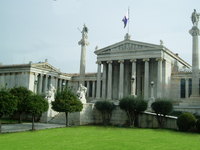
 Added by Oerwinde
Added by OerwindeOrganization Edit
Edit
The government of the Greek Federation is organized into three branches, the Executive, the Legislative, and the Judicial. There is currently no constitutionally defined Head of State, as the monarch has yet to be crowned, as the position was not defined until the monarchical referendum in October of 2010. Currently the powers of the head of state are invested in the Speaker of Parliament, awaiting the coronation of the monarch, currently scheduled for October 28th, 2011, after which date he will become the Head of State. The Legislative Branch is defined as the Federal Parliament, currently housed in the House of Parliament in New Athens. The Judicial Branch is the Areios Pagos (Άρειος Πάγος), the supreme court of the Greek Federation. It is the highest court of the Federation, but generally only deals with constitutional cases, as the States may have differing laws in regards to criminality.Parliament and the Political Parties Edit
Edit
The Federation Parliament is headed by its speaker, and currently contains three hundred seats, divided proportionately between the members of the Federation. These are elected or chosen in various ways by the Federation members, as per their own laws, such as partially chosen, like by the Despots in Cyrenaica or Morea, directly elected like in Hellas, or a member from each of the top six parties like in Thrace. The total of representatives is expected to increase in number as the members of the Federation increase in size and population, as well as quite possibly in number.The majority of representatives in the Parliament of the Greek Federation are from what can be considered to be national parties. However, a fairly large percentage of seats are still controlled by regional parties, especially in Kemet. Various parties that represent minorities generally left their members alone when it comes to voting between a monarchy and a republic, and other similar issues that are national in basis, or completely abstain from voting.
Parliament is led by the Speaker, who is the leader of the party which either forms the governing ministry outright, or leads the governing coalition. They are assisted by a varying number of deputy speakers, which at this time consist of the leaders of the other major parties in the governing coalition - it is likely in the event of a majority government that the leader of the opposition will hold this role. The Emperor, after future elections, will open Parliament. While not able to dismiss the speaker or call new elections, the Emperor's signature will be required on legislation passed, and he can refuse to do so - but Parliament, with a two-thirds majority, can easily overrule him.
| Name | Political Views | Seats in Parliament | Power Base | Leader |
|---|---|---|---|---|
| Panhellenic Socialist Movement Panellinio Sosialistikó Kínima | Socialism, against a Monarchy | 58 | Dodecanese Republic, Hellas, Heptanesa, Cyprus | Dimitris Christofias |
| New Democracy Néa Dimokratía | Conservatism, leans towards a monarchy | 52 | Heptanesa, Hellas, Dodecanese Republic | Spilios Spiliotopoulos |
| Coptic Association الرابطة القبطية | Coptic Rights, Religious Tolerance and Moderation, neutral on the Monarchy-issue | 45 | Kemet | Amr Khaled |
| Union of Royalists Énosi ton Vasilofrónon | Favors the establishment of a Monarchy, Conservative-leaning | 34 | Thrace, Cyrenaica, Morea, Agion Oros | Antonis Paschalides |
| Golden Dawn Hrisi Avgi | Favors a Monarchy, as well as extreme nationalism | 33 | Morea, Cyrenaica, Cyprus | George Kollias |
| Nasserist Party الحزب الناصري | Independence for Kemet | 28 | Kemet | Nazir Tanbouli |
| New Wafd Party حزب الوفد الجديد | Egyptian Nationalism, wants Kemet to rejoin Egypt | 12 | Kemet | Ayman Nour |
| Orthodox Democratic League Orthódoxi Dimokratikí Koinonía | Christian Democracy, favors a Monarchy | 11 | Agion Oros, Thrace | Ioannis Liapis |
| National Front for the Salvation of Libya الجبهة الوطنية لإنقاذ ليبيا | Independence of Libya | 10 | Cyrenaica | Imbarek Shamekh |
| Party for Peace Kómma gia tin Eiríni | Pacifistic, against a Monarchy, wants detente with Turkey and Macedonia and to leave the ADC | 7 | Delian League | Nikolaos Sifounakis |
| Ecological Movement of Greece Oikologikí Kínisi Elláda | Environmentalism, neutral on the Monarchy issue | 6 | Hellas, Delian League, Heptanesa, Thrace | George Tsekos |
| Turkish League Türk Ligi | Turkish Nationalism, Anti-Monarchy, demands return of Turkish areas and cession of parts of Cyprus to the Sultanate | 3 | Dodecanese Republic, Thrace | Mehmet Ali Talat |
| Party for Justice and Integration Partia për Drejtësi dhe Integrim | Albanian rights, Extreme anti-Macedonia views | 1 | Heptanesa | Laert Vasili |
Currently, the Speaker is Spilios Spiliotopoulos, the Leader of New Democracy. The three deputy speakers are George Kollias, Leader of Golden Dawn, Amr Khaled, Leader of the Coptic Association, and Antonis Paschalides, Leader of the Union of Royalists.
Administrative Divisions Edit
Edit
The Federation of Greece is currently made up of Nine autonomous states, two federal territories, and one mandate.| State | Capital | 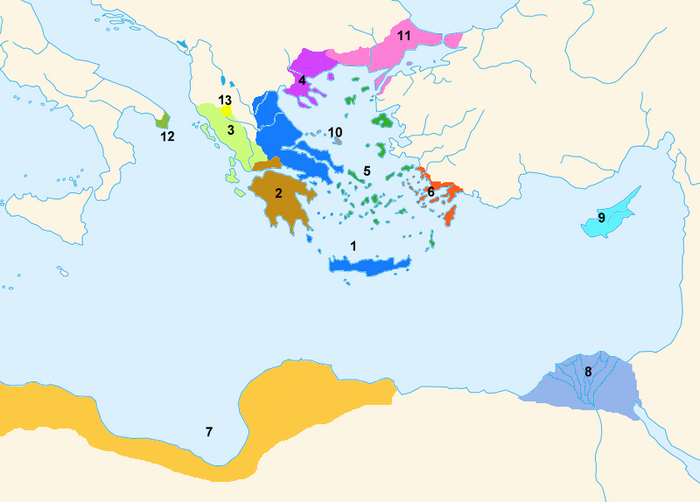 | |
| 1 | Hellenic Republic | Heraklion | |
| 2 | Morea | Sparti | |
| 3 | Heptanesa | Kerkyra | |
| 4 | Agion Oros | Karyes | |
| 5 | Delia | Ermoupoli | |
| 6 | Dodecanese Republic | Rhodes | |
| 7 | Cyrenaica | Euesperides (Benghazi) | |
| 8 | Kemet | Alexandria | |
| 9 | Cyprus | Lefcosia | |
| 10 | Skyros Federal District | New Athens | |
| 11 | Thrace Reclamation Zone | New Byzantium (Ereglisi) | |
| 12 | Lecce Mandate | Otranto |
International Relations Edit
Edit
The Greek Federation maintains friendly relations with most of its surrounding neighbors, with especially strong ties with Egypt and the Algerian city states. With Slovenia and Croatia applying for membership in the ADC, relations have been improving sharply there as well.The Bulgarian successor state of Rhodope has been close partner of Greece for a long time, even taking part in the reclamation of Thrace. Inclusion of nearby areas over the Greek border in the Rhodopian state, while at first an issue between the two, matters little today because of the understanding that it will eventually revert to Greece, likely either going to Thrace or Agion Oros. As of late, however, there is talk that they may be allowed to keep the land, pending a referendum of its citizens and there is even a few people calling for Rhodope to join the Federation outright. It was also believed that some sort of formal alliance between the two would be announced. This was proven accurate when back-channel negotiations resulted in the signing of the Treaty of Skyros between the two parties, establishing an official alliance, on July 15th, 2011.
Relations are very frosty with both Macedonia and the Turkish Sultanate at this time, and the recent establishment of the Mediterranean Defense League between the two is a great cause for concern.
Sicily has been Greece's only rival in the Mediterranean for a long time and the Greeks, with the rest of the ADC, managed to eke out a narrow victory over them very recently in the Second Sicily War over them.
It was long believed that the Federation is leading some sort of negotiations in Thrace towards some sort of new diplomatic entity. The Crimean and Transylvanian consuls from their consulates in New Byzantium, along with members of the Greek Parliament, were seen often at the offices of the Rhodopian Consulate in Vize. Minor diplomats from the Kuban and Don Republics, as well as the Partian vassal-state, in former Hungary, of Transylvania, were also been observed on occasion too.
On August 31st, 2011, the rumors were proven true when in New Byzantium the Greek government, among others, signed the Black Sea Accords, forming the Black Sea League. In return for making economic investments, dropping a few trade barriers, and making a couple of defense guarantees, the Federation gained a little more security, and opened up more economic opportunities.
Greece is a member of the League of Nations, a signatory of the Black Sea Accords, and a member of the Atlantic Defense Community.
Economy Edit
Edit
Culture Edit
Edit
Military Edit
Edit
Structure Edit
Edit
Greece is a powerful military force in the Mediterranean. The Minister of Defense and Chief of the General Staff is Admiral Panagiotis Chinofotis, formerly the Chief of Naval Operations and thus Head of the Navy. The Ministry of Defense is located on Skyros.Structurally, The Greek armed forces are composed of a Federal Military, and what is referred to as a "National Reserve" in each member of the Federation, and under the control of those governments, though subject to orders from the Federal government and the Federal Military, much like the American National Guard of Pre-Doomsday.
Many elements of the Greek Military were destroyed on Doomsday, yet many others were able to successfully survive and retreat to safety. It is these forces that form the core of the modern Greek military, having trained, and even still commanding, many of its soldiers. Others came from the remnants of the Cypriot, Libyan, and Egyptian militaries, among others.
Army Edit
Edit
The Greek Army is composed of four main armies, headquartered at:- Army of Africa, responsible for Cyrenaica and Kemet and headquartered in Alexandria.
- Army of the West, responsible for Heptanesa, Morea, and mainland Hellas, and headquartered in Sparti.
- Army of the Islands, responsible for Agion Oros, most of Delia, the islands of Hellas, the Skyros Federal District, and Cyprus, and headquartered in Ermoupoli.
- Army of the East, responsible for parts of Delia, Thrace, and the Dodecanese and headquartered in New Byzantium.
Prominent formations from prior to Doomsday include the 12th and 16th Mechanized Infantry Divisions, 20th Armored Division, and the 8th Infantry Division, all of which weathered Doomsday somewhat intact even if they were forced to abandon most of their equipment. Today, these formation are stationed in Hellas, Thrace, Cyrenaica, and Heptanesa, respectively. The 1st Army Aviation Brigade and its helicopters also managed to escape largely intact, fleeing to Crete after government recall, where they remain based today, and primarily consist of older helicopters and newer ones purchased from the Celtic Alliance.
The 1st Infantry and 2nd Mechanized Infantry Divisions, largely destroyed on Doomsday and in its aftermath, have also been reconstituted, and are located in the Dodecanese Republic and Kemet, respectively.
A special detachment, in co-ordination with Naval Marines, has been installed in the Lecce Mandate, and another is in place at the Suez Canal as well.
Navy Edit
Edit
The Greek Navy is based out of the Morean island of Poros, where Greek navy personnel have long been trained. As with many post-Doomsday navies, it is composed of the remnants of the Greek Fleet before Doomsday, and what has been built since that time. Largely, this means a fleet with a backbone of surviving destroyers, along with frigates, a few submarines, and smaller craft - minesweepers, patrol boats, and what are approximately the equivalent of corvettes like those used in various navies during the Second World War.Naval Marines also play a large role, with small detachments being stationed on most naval vessels, where they function as support and boarding personnel. A trio of Marine regiments, stationed at Poros, Ermoupoli, and Alexandria, are separate from the main body of the Navy.
Naval forces, outside of National Reserve vessels - which are largely concentrated in the League - are divided into five separate fleet detachments:
- The Aegean Fleet, based on Skyros and responsible for the Aegean Sea and its islands.
- The Black Sea Fleet, based in New Byzantium and responsible for the Straits and the Black Sea.
- The Cyrenaican Fleet, stationed in Euesperides, responsible for the Western Mediterranean and security in the region of Sicily
- The Ionian Fleet, based in Corfu, responsible for the Ionian Sea and nearby regions.
- The Levant Fleet, out of Port Said, responsible for the Eastern Mediterranean and the Canal.
Air Force Edit
Edit
The Air Force is based out of the airbase at Souda Bay, in Hellenic territory on Crete. It is composed of surviving aircraft from before Doomsday, and then aircraft the have either been built or purchased by the Greek government since.Aircraft in the Air Force vary a great amount. Leftover from Doomsday, there are F-4E Phantoms, A-7 Corsairs, Mirage F1CG's, F-104G Starfighters, and F-5 Freedom Fighters, which are all aging are are to be replaced as soon as possible. They are seldom used, and form, for the most part, the reserves of each member of the Federation.
Aircraft made in Greece, using the restored State Aircraft Factory in Phaliron and the repaired facilities of the Hellenic Aerospace Industry in Tanagra, along with the industry of the Delian League, were at first rough copies of the Mirage F1CG, and the A-7 Corsair, largely using spare parts and rough blueprints from former technicians who had done maintenance work on them.
In 1998, using their experience with the rough copies of the F1CG and the A-7, as well as aid from the Celtic Alliance and the Nordic Union, Greek engineers designed a new plane for the air force, thought by pilots to be the rough equivalent of an upgraded version of the F-15 Eagle used by the American military before Doomsday, referred to as the "KEA 15 Hermes," which reflects its similarities to the Eagle. This basic model, though up to "F" in variants now, continues to be produced and forms the backbone of the aircraft used by the Air Force and has been exported to several of their allies.
In recent years, a fair number of the Saab JAS 39 Gripen and the Lynx Helicopter have been purchased from the Nordic Union and the Celtic Alliance, respectively, as well. The Federation has been given the rights to produce their own variants of these models, with production expected to begin at Phaliron sometime in the fall of 2011 on copies of the current Celtic and Nordic productions.
The Air Force is divided into twelve separate combat wings, all of which are headed by a brigadier-general. These are divided into three air armies, each under a major-general. The Chief of staff holds the rank of lieutenant-general. These are located at:
- 110th Combat Wing: Euesperides
- 111th Combat Wing: Alexandria
- 112th Combat Wing: Suez
- 113th Combat Wing: Lefcosia
- 114th Combat Wing: Tanagra
- 115th Combat Wing: Souda Bay
- 116th Combat Wing: Araxos
- 117th Combat Wing: Andravida
- 118th Combat Wing: Rhodes
- 119th Combat Wing: Ioannina
- 120th Combat Wing: Lemnos
- 121st Combat Wing: New Byzantium
- 1st Air Army: Araxos
- 2nd Air Army: Alexandria
- 3rd Air Army: Lemnos
Εγγραφή σε:
Αναρτήσεις (Atom)
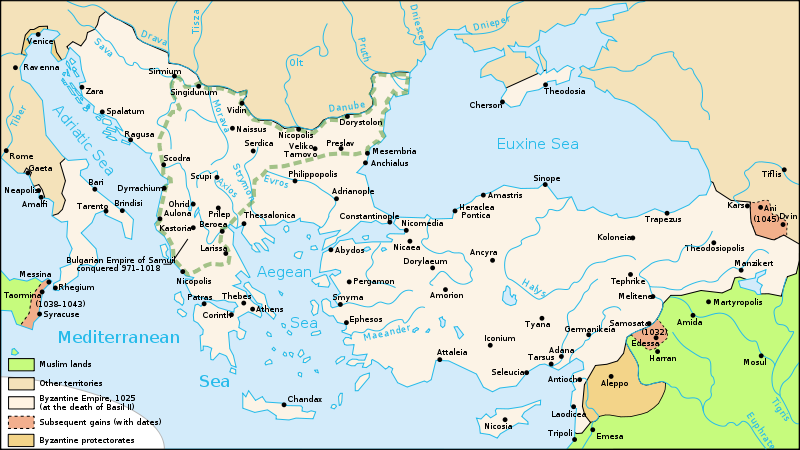
.jpg)



